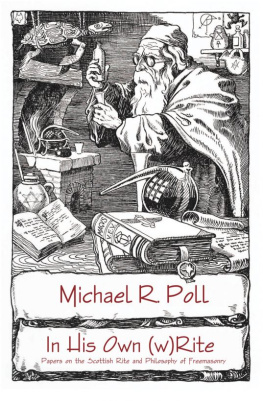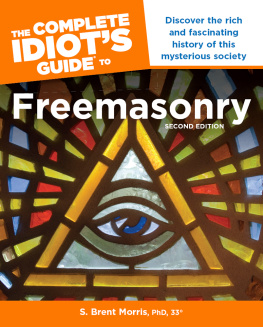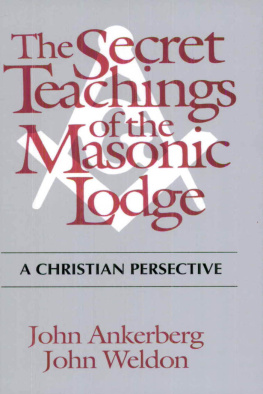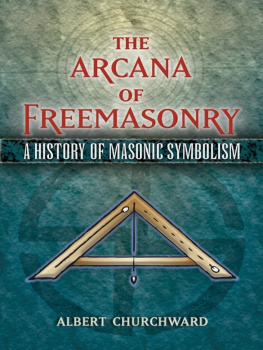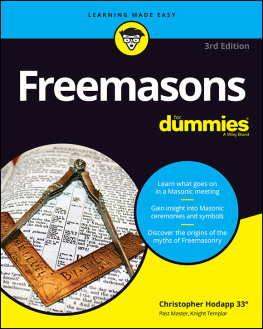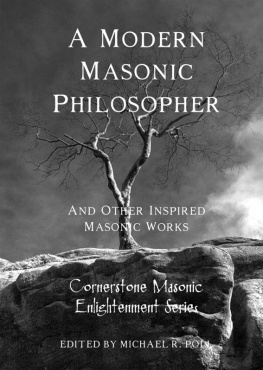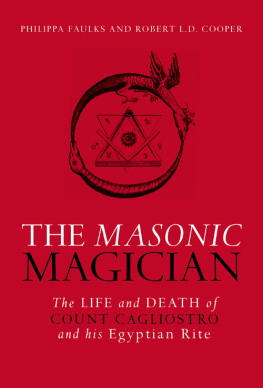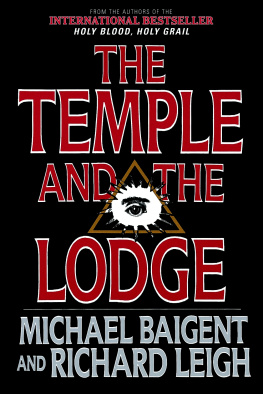Michael R. Poll - In His Own (w)Rite
Here you can read online Michael R. Poll - In His Own (w)Rite full text of the book (entire story) in english for free. Download pdf and epub, get meaning, cover and reviews about this ebook. publisher: Cornerstone Book Publishers, genre: Religion. Description of the work, (preface) as well as reviews are available. Best literature library LitArk.com created for fans of good reading and offers a wide selection of genres:
Romance novel
Science fiction
Adventure
Detective
Science
History
Home and family
Prose
Art
Politics
Computer
Non-fiction
Religion
Business
Children
Humor
Choose a favorite category and find really read worthwhile books. Enjoy immersion in the world of imagination, feel the emotions of the characters or learn something new for yourself, make an fascinating discovery.
- Book:In His Own (w)Rite
- Author:
- Publisher:Cornerstone Book Publishers
- Genre:
- Rating:4 / 5
- Favourites:Add to favourites
- Your mark:
- 80
- 1
- 2
- 3
- 4
- 5
In His Own (w)Rite: summary, description and annotation
We offer to read an annotation, description, summary or preface (depends on what the author of the book "In His Own (w)Rite" wrote himself). If you haven't found the necessary information about the book — write in the comments, we will try to find it.
New York Times bestselling writer and Masonic historian, Michael R. Poll gives us a wonderful collection of some of his best Masonic papers and lectures. From rethinking long held beliefs regarding the early development of the Scottish Rite to the general philosophy and needs of today's Freemasonry, this book provides education, enlightenment and enjoyment.
In His Own (w)Rite — read online for free the complete book (whole text) full work
Below is the text of the book, divided by pages. System saving the place of the last page read, allows you to conveniently read the book "In His Own (w)Rite" online for free, without having to search again every time where you left off. Put a bookmark, and you can go to the page where you finished reading at any time.
Font size:
Interval:
Bookmark:
In His Own(w)Rite
By Michael R. Poll
Copyright Michael R. Poll 2011
All rights reserved under International andPan-American Copyright Conventions.
Smashwords License Statement
This ebook is licensed for your personalenjoyment only. This ebook may not be re-sold or given away toother people. If you would like to share this book with anotherperson, please purchase an additional copy for each reader. Ifyoure reading this book and did not purchase it, or it was notpurchased for your use only, then please return to Smashwords.comand purchase your own copy. Thank you for respecting the hard workof this author.
Smashwords Edition
Cornerstone Book Publishers
New Orleans, LA
First Cornerstone Edition - 2011
www.cornerstonepublishers.com
E-Book Edition ISBN:1613420420
ISBN-13: 978-1-61342-042-3
Print Edition ISBN:1-61342-019-6
ISBN-13: 978-1-61342-019-5
MADE IN THE USA
Table of Contents
Introduction
What's Freemasonry? Well, it pretty muchdepends on who you ask. In the 35+ years that I have been a Mason Ihave visited quite a few lodges. No two have been exactly alike.Lodges seem to develop personalities of their own, much likepeople. Some are relaxed and laid back, some are more formal. Someare very healthy with work going on all the time and some, sadly,are on life support. But, in each lodge when Ive talked to theindividual members, they have expressed a true caring about theirmembership. Sure, it does not mean the same thing to each one ofthem. The one in the kaki pants and bright Hawaiian shirt with thedonut in his hand might view the reason for his membershipdifferently than the one in the tux with the white gloves and aglass of wine, but, so what? Who said Masonry has to mean the samething to everyone?
The common denominator in all lodges is thatMasonry lifts Masons up a bit more from where they started. Noteveryone is a philosopher and not everyone will draw the deepermeanings from the Masonic ritual, but we all can benefit from beingtold to try and be better than we are today. Sure, few (if any)live up to the deepest teachings of Freemasonry, but is our goalperfection or the striving for it? I believe that if we just try tolive as Masonry teaches, recognizing that we all fail from time totime, then we are doing what is expected of us. Masonry is not foreveryone and we can not expect that it will, in any way, satisfysomeone who is just not Masonic material. But, for those who aretouched by Masonry, no matter what they are wearing, eating or thestate of their lodge, they feel very deeply about being a Mason. Itis important to them and no matter how much or little they know ofthe ritual or its deeper teachings, it is of value to them.
Our Masonic history is important to us. It isimportant that we know who we are and from where we come. But, thisis not really a Masonic history book. I have, however, a deepinterest in the early history of the Scottish Rite. I have thisinterest because we have such sketchy accounts of the early days ofit. While this is not a Masonic history book, I have included somehistory papers exploring aspects of Scottish Rite history that wemight not see explored too often. This is, also, not a book ofphilosophy. But, I do feel that we can all benefit from the lifelessons Masonry teaches. I try to teach Masonry in a way thatapplies to everyone, so that we all can see and experience itslessons. With this in mind, I've included some of these basicphilosophical lectures and papers.
So, that's what we have here; a collection ofhistory and philosophical papers - with some other bits I finduseful or noteworthy. If this book gives you just a moment to thinkabout yourself, your role in Masonry or gives you any cause tothink of ways to improve yourself, then I consider this book aworthwhile endeavor.
Be happy, enjoy life and make each beautifulmoment count.
Michael R. Poll
Fall, 2011
In His Own (w)Rite
Fluid Masonry: The Art ofChange
The Journal of the Masonic Society, Issue 7, 2010
WHEN WE BOIL FREEMASONRYDOWN to its most basic element, we find a very simple message:make yourself better. Such a statement can, however, be likenedto the phrase be happy. It sounds easy enough, but how do you doit? How do you know when you are better? What is better? What seems to be anuncomplicated message becomes difficult to put into practice, evento understand. Such is the nature of symbolism.
We can start on the path of symbolicunderstanding by looking at nature. If you look at a beautifulmountain stream, you can find more than beauty. You can findillusion (often, the guardian of symbolism). Flowing water goesaround a large rock in the stream. The illusion is that the rock isthe master. What we believe to be truth is the sight of the wateryielding to the rock and being forced to flow around it. We seethis and accept it as truth. Our error is that we determined thetruth before we gathered all the facts. In time, gentle, flowingwater can reduce the largest stone to a pebble. The rock is not themaster. One lesson to learn is that what we see, hear, feel andbelieve might well prove to be something other than fact. We musttrain ourselves to withhold judgment.
In Freemasonry, a subtle lesson is taughtearly on by putting us in a position where we cannot depend on whatwe can see. We are forced to depend on others for guidance. We arealso forced to use senses other than those we would normally relyupon. We must change in order to adapt to this new situation. Theillusion is that we have been handicapped and deprived of receivingthe full benefit that would have been afforded us if we hadcomplete use of all of our senses. But the illusion masks the factthat we are forced to adapt to our condition precisely because wehave been placed in such a state. We simply cant act or perform onour own. We need guidance.
The three degrees in Craft Masonry are oftensaid to represent the three stages of human life: youth, adulthoodand old age. How do we progress through these stages? We change. Aschildren, we play, grow and learn. As adults, we put into practicewhat we have learned, and in old age we impart to others what wehave learned. In each stage, we change in body and mind. It is thenormal way of life. What would be abnormal is if no change tookplace.
Lets look again at the water and the rock.The gentle, flowing water cannot and does not break the rock bydirect force. Water changes its direction and flows around therock; in doing so, it also gradually affects change in the rock.The gentle pressures of the water force the rock to give way andreduce itself in size. The rock is not the master after all. Changeis one of the unavoidable facts of all existence. Any attempt toavoid change only results in unnatural waste of energy.
The lessons of Masonry are such that we muststudy them with a childs open and willing mind. In certain aspectsof our teachings, we might remember we are told that it is notacceptable to bring innovations into the body of Masonry. Aninnovation is change. Are we being told that we cannot or shouldnot change? Not at all.
As individuals, we changeevery day of our lives. We grow older, which brings physical andmental changes. We have no choice in these types of changes. Wealso have the option to make free-will choices in our lives. Wemight opt to eat a more healthful diet, to exercise, or in some wayimprove our lives. There are countless changes that we can choose.We also might make the decision not to make any free-will changes. It is our choice asindividuals.
But when we speak of innovations in Masonry,we are speaking of something quite different. The innovations thatare made in Masonry should never be the choice of any singleindividual. Changes should be the collective will of themembership. In Masonry it is the lodge, not the Worshipful Master,who decides the direction to be taken. The Worshipful Master onlysteers the ship in the desired direction.
Next pageFont size:
Interval:
Bookmark:
Similar books «In His Own (w)Rite»
Look at similar books to In His Own (w)Rite. We have selected literature similar in name and meaning in the hope of providing readers with more options to find new, interesting, not yet read works.
Discussion, reviews of the book In His Own (w)Rite and just readers' own opinions. Leave your comments, write what you think about the work, its meaning or the main characters. Specify what exactly you liked and what you didn't like, and why you think so.

